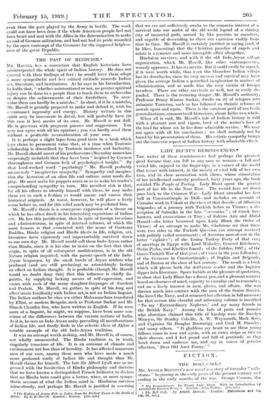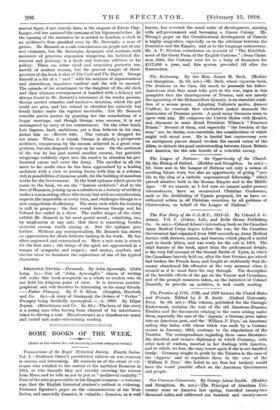FICTION.
THE ROLL-CALLt
Mn. ARNOLD BENNETT'S now novel is a story of irregular " mite. stones " beginning in the early years of the present century and ending in the early months of the war. George Cannon, the • My Erestaiseenra. Ity Fanny Lady. Blunt. With an Introdactioa Admiral sir ltoarlyn Wanly, union : Mil my. 1155. t The Roll Call. 157 Arnold Ikuuctl. London; Hutchinson and Co. ed. tte4
central figure if not exactly hero, is the stepson of Edwin Clay- hanger, and has assumed the surname of his bigamous father. At the opening of the narrative he is settled in London, a clerk in an architect's firm presided over by Mr. Enwright, a man of genius. Mr. Bennett as a rule concentrates on people not of any real eminence, but Mr. Enwright, dyspeptic and sardonic, with moments of generous expansion tempering his habitual dis- content and jealousy, is a fresh and welcome addition to his gallery. There are other vivid and surprising portraits too, mostly of modem women, but the general temper of three- quarters of the book is that of The Card and The Regent. George himself is a bit of a " card " with his mixture of ingenuousness and shrewdness, impulsive candour and the will to succeed. The episode of his attachment to the daughter of the old clerk and their ultimate estrangement is handled with a delicacy not always found in Mr. Bennett'e treatment of the tender passion. George needed stimulus and exclusive devotion, which the girl could not give, and her refusal to abandon her unlovely but lonely father made the rupture inevitable. Yet Mr. Bennett consults poetic justice by granting her the consolations of a happy marriage, and though George wins success, it is not untempered by envy of her contentment. On the other hand, Lois Ingram, hard, ambitious, yet a firm believer in his star, makes him an efficient wife. The curtain is dropped for ten years. When it is raised, George is already a prosperous architect, conspicuous by the success achieved in a great com- petition, but not disposed to rest on his oars. On the outbreak of the war he has just scored another success, but patriotic misgivings suddenly ripen into the resolve to abandon his pro- fessional career and enter the Army. The sacrifice is all the more to his credit since he has been approached by a leading architect with a view to joining forces with him in a scheme, rich in possibilities of immense profit, for the building of munition works for the Government. In the brief epilogue which gives its name to the book, we see the " famous architect," deaf to the lure of Mammon, joining up as a subaltern in a battery of artillery under a commanding officerwho treats him with no consideration, expects the impossible at every turn, and challenges George to a new competition of efficiency. The story ends while his training is still in progress the first round between George and his Colonel has ended in a draw. The earlier stages of the story exhibit Mr. Bennett in his most genial mood ; admitting, too, by implication at any rate, that there is something besides material success worth aiming at. But the epilogue goes further. Without any sentimentalism, Mr. Bennett has shown an appreciation for ideals hitherto lacking in his work. He has often engrossed and entertained us. Here a new note is struck for the first time ; the things of the spirit are approached in a temper of sympathy and respect ; and money, comfort, and success cease to dominate the aspirations of one of his typical characters.



































 Previous page
Previous page